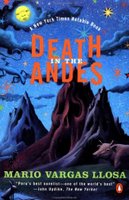I had the chance to hear this acclaimed Peruvian novelist speak, and a free copy of a book to read, so I decided to try it out; as it turns out, I didn't make it to any of Llosa's lectures, and I'm not sure how I feel about his book. The title might make you think it's a mystery-- and it is, to an extent; but it doesn't feel like much of one until near the end. The book is well-written and interesting, but not particularly pleasant to read because of the many deaths and the brutality.
The main action of the story centers on the Civil Guard Lituma, who has been stationed in the remote town of Naccos (formerly a mining town, now a work camp where they are trying to build a highway through the mountains) to investigate the disappearance of three men. This is a time of unrest because of the violence that is being done by the guerilla rebels in the mountains, which we get glimpses of through other characters experiences; after a while, I didn't want to meet or engage with any new characters, because I knew they would be brutally killed by the terrucos (the rebels/terrorists).
One of the more interesting features of the book is the use of time & story-telling. Since there is not much to do in Naccos, Lituma spends his evenings listening to his assistant Tomasito talk about his adventures with the prostitute he fell in love with (which seems more like a fantasy than anything real, and I was actually a bit surprised at the end when the woman in question showed up). But the interesting thing about this is the way this story is told, and interspersed with the dialogue of the two men lying on their cots in the guard's shack in Naccos. The story will shift back and forth seamlessly, so sometimes it takes a little extra attention to determine who is saying what. It does add a wonderful oral quality.
Towards the end, the book felt more like a more normal mystery. Lituma meets a scholar who studies the Andes, and the scholar's comments about the "apus" or gods of the mountains and the pagan practices of the mountain Indians gives Lituma an insight into the disappearances of the three men he has been investigating. He figures out that the men were offered as sacrifices to the mountain gods in an attempt to keep the highway project going (so the men would have jobs), and to protect the town from the terrucos. Lituma can't get any proof of this, and his superiors wouldn't believe such superstitious nonsense even if he told them. Finally, the night before he is to leave, he gets confirmation-- and more details than he finds he wanted to know-- from a drunk man who cannot escape his guilt at his own participation in these horrible rituals which failed to accomplish anything. (This is similar, of course, to what happened in many towns when the terrucos come, as the townsfolk are complicit in the horrible "judging" and murdering of their own neighbors.)
Llosa paints a dark landscape full of strange characters-- like the vampire-like pishtacos, who live in caves and feed on the fat of humans. Actually, I was quite surprised that the book had such a "happy" ending (compared to the rest of it); it didn't seem to quite fit. I kept expecting the terrorists to show up and kill everyone, but they never did.
| Title: | Death in the Andes |
|---|---|
| Author: | Mario Vargas Llosa (translated by Edith Grossman) |
| Date published: | 1993 |
| Genre: | Fiction |
| Number of pages: | 275 |



0 comments:
Post a Comment